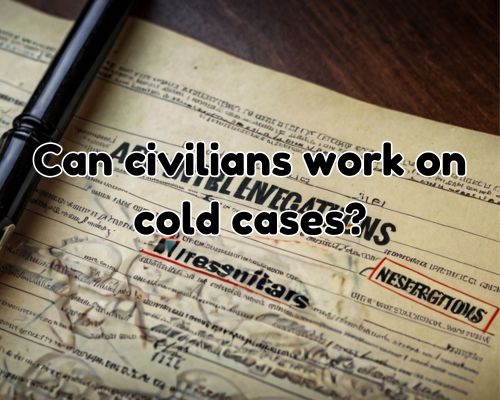
Can Civilians Work on Cold Cases?
Exploring the Possibility of Non-Law Enforcement Involvement in Unsolved Crimes
“Have you ever wondered if civilians can work on cold cases? The short answer is yes, they can. Cold cases are unsolved crimes that have gone dormant for a long period of time. Law enforcement agencies often don’t have the resources to keep investigating these cases, but that doesn’t mean they’re forgotten. Civilians can play a vital role in helping to solve these crimes.” said Sherlock Holmes of Ali Private Investigator Tampa.

There are many ways that the public can assist in cold case investigations.
One of the most important is by providing tips and information to law enforcement. Sometimes people may not realize that the information they have could be crucial to solving a case. By sharing what they know, they could help bring closure to a victim’s family and bring a perpetrator to justice.
Additionally, civilians with specialized skills, such as forensic scientists or private investigators, may be able to offer their expertise to help solve cold cases.
It’s important to note that while civilians can assist in cold case investigations, they can’t take over the investigation entirely. Law enforcement agencies are ultimately responsible for solving crimes, and civilians must work within the framework of the law. However, by working together, law enforcement and the public can increase the chances of solving cold cases and bringing justice to victims and their families.
The Role of Civilians in Cold Case Investigations
Cold cases are often considered unsolvable by law enforcement agencies due to a lack of leads, evidence, and technological advancements. However, civilians can play a significant role in the investigation of cold cases. With Ali Private Investigator Tampa, we will discuss the various ways in which civilians can contribute to cold case investigations.
Public Contributions to Cold Cases
The public can contribute to cold case investigations by providing tips and information about the case.
Many law enforcement agencies have created online platforms and hotlines where the public can submit tips and clues anonymously. Social media is also an effective tool for spreading information about cold cases and reaching a wider audience.
Sharing information about cold cases on social media can lead to new leads and witnesses coming forward.
Partnerships Between Civilians and Law Enforcement
Partnerships between civilians and law enforcement agencies can be beneficial in solving cold cases.
Cold case programs have been established in many jurisdictions, and these programs often involve partnerships between law enforcement agencies and civilians. These programs provide training and resources to civilians who want to assist in the investigation of cold cases.
The partnership between civilians and law enforcement agencies can lead to the discovery of new evidence and the identification of suspects.
Educational and Business Involvement in Cold Cases
Educational institutions and businesses can also contribute to cold case investigations.
Educational institutions can provide training and resources to law enforcement agencies and civilians who want to assist in the investigation of cold cases. Businesses can provide financial support and resources to law enforcement agencies and cold case programs.
Impact and Outcomes of Civilian Involvement
Solving Cold Cases and Clearance Rates
Civilian involvement in cold cases has proven to be effective in solving previously unsolved homicides and violent crimes. The National Institute of Justice (NIJ) reports that cold case programs have solved a substantial number of violent crime cold cases, including homicides and sexual assaults.
In some cases, cold case units have been able to clear up to 50% of their cases with the help of civilian volunteers.
Technological Advancements and Forensic Contributions
Forensic technology has advanced rapidly in recent years, and civilian involvement has played a significant role in utilizing these advancements to solve cold cases.
Through the use of DNA analysis, forensic science has been able to provide answers in cases that have been unsolved for decades.
The Golden State Killer case is an example of how civilian involvement and forensic technology can work together to solve a cold case. In this case, a civilian investigator used a genealogy website to identify a suspect, and forensic DNA analysis confirmed the suspect’s identity.
Closure for Families and the Community
The impact of civilian involvement in cold cases goes beyond solving crimes. It provides closure for families and the community affected by the crime.
The Los Angeles Police Department’s Cold Case Squad has reported that solving a cold case can bring peace of mind to the victim’s family and help the community heal. Civilian involvement in cold cases can also bring attention to missing persons cases and unsolved homicides that may have been forgotten over time.
Civilian involvement in cold cases has a significant impact on the criminal justice system. It has proven to be effective in solving previously unsolved homicides and violent crimes, utilizing technological advancements and forensic contributions. Additionally, it provides closure for families and the community affected by the crime.
With the help of civilian volunteers, cold case units can continue to make progress in solving criminal cases that have long been forgotten.